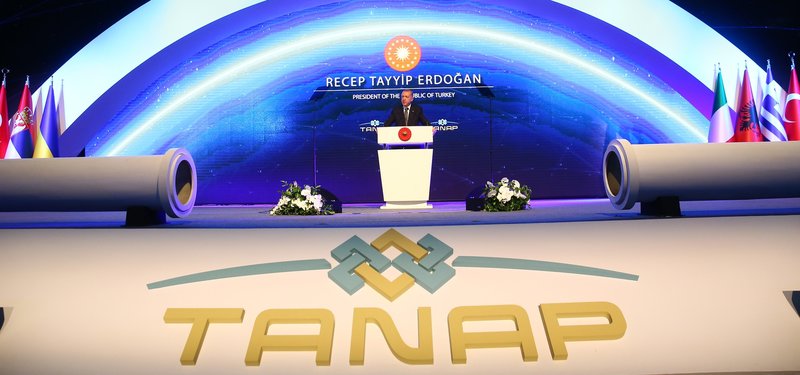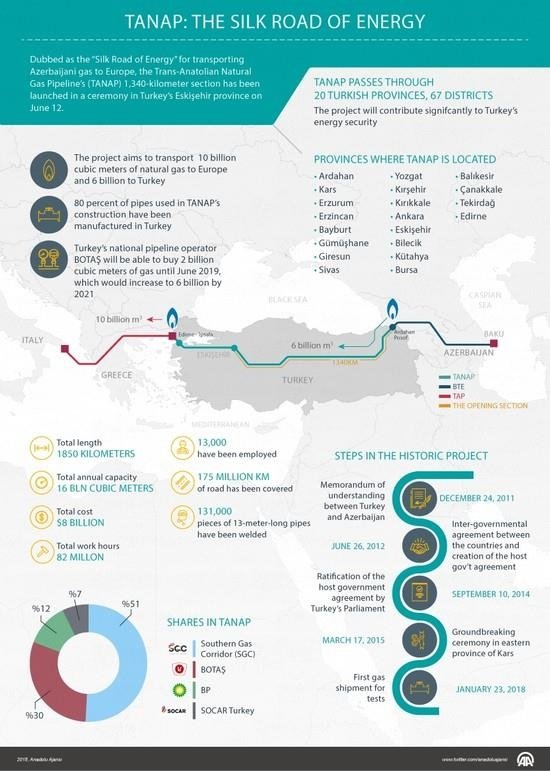
Turkey's Erdoğan opens TANAP to pump Azerbaijan gas to Europe
The Trans-Anatolian Natural Gas Pipeline (TANAP), which will bring gas from the Shah Deniz-2 gas field to the Turkish border through Georgia, via the South Caucasus Pipeline, and then connecting to the Trans-Adriatic Pipeline on Turkey's İpsala border, going on to deliver Azeri gas to European markets through pipes in Greece, Albania and the Adriatic Sea before coming ashore in Italy's South, started operations on Tuesday at a grand inauguration ceremony in Turkey's Eskişehir province.
- World
- Agencies and A News
- Published Date: 12:00 | 12 June 2018
- Modified Date: 07:27 | 12 June 2018
Turkish President Recep Tayyip Erdoğan on Tuesday opened a new gas pipeline that will pump Caspian gas from energy-rich Azerbaijan across Anatolia to Europe for the first time.
The $8.5 billion Trans-Anatolian Natural Gas Pipeline (TANAP) is one of several mega projects being showcased by Erdoğan.
The TANAP pipeline connects with the South Caucasus Pipeline which pumps gas from the vast Azerbaijani Shah Deniz 2 field in the Caspian, via Azerbaijan and Georgia, to Turkey.
The pipeline is then to link to the west with the Trans Adriatic Pipeline (TAP) which will pump the gas through Greece and Albania to Italy.
Taken together, the entire project is known as the Southern Gas Corridor which is costing some $40 billion to build and was inaugurated in late May.
The system -- backed by the EU and United States -- will allow Azerbaijan for the first time to pump its gas direct to Europe while bypassing Russia.

- 'ENERGY SILK ROAD' -
Erdoğan inaugurated the pipeline at a ceremony attended by leaders including Azerbaijan's President Ilham Aliyev, Ukrainian President Petro Poroshenko and Serbian President Aleksandar Vucic in the Turkish region of Eskisehir southeast of Istanbul, one of 20 provinces in Turkey the pipeline passes through.
"TANAP is the latest fruit of a shared vision," Erdoğan said at the opening ceremony, describing the pipeline as part of a new "energy Silk Road".
The leaders then watched as the final section of the pipeline was lifted into place and then turned a wheel to allow the gas to flow.
The Turkish leader is battling a tightly fought contest for presidential and parliamentary elections, boasting at rallies nationwide of his ability to deliver on big projects.
During Erdoğan 's over 15 years in power, first as premier and then as president, Turkey has seen a massive revamp of infrastructure with new high speed rail lines, roads and the Bosphorus in Istanbul spanned by one new bridge and two undersea tunnels.
He is touting a daring new plan to build a Panama-style shipping canal in Istanbul as boasting that a brand new airport for the city is near complete.
The 1,850 kilometre (1,150 mile) TANAP will initially pump 2 billion cubic metres of gas annually for use in Turkey, rising to 6 billion. By 2019 another 10 billion cubic metres of gas will be delivered into Greece for use in Europe.
A majority 58 percent in the TANAP project is owned by Azerbaijan through state energy firm SOCAR. Turkish state energy firm Botaş and British energy giant BP have minority stakes of 30 percent and 12 percent respectively.
TANAP does not solely address Turkey's gas supply security by diversifying resources, but will also boost European supply security by enriching the energy resource channel for continental countries while enabling Azerbaijan to expand into new export destinations.
Accordingly, the project boosts the regional climate of peace and stability, bringing a number of countries together for energy cooperation.
TANAP is also believed to enable other gas producers to capitalize on the Silk Road of energy, thereby reshaping global energy geopolitics.
The legal framework of the project was devised through the agreement entitled the "Intergovernmental Agreement between the Republic of Turkey and the Azerbaijan Republic for the Trans-Anatolian Natural Gas Pipeline System," signed in June 2012 in Istanbul. The construction of the project started in March 2015 in the eastern province of Kars.

